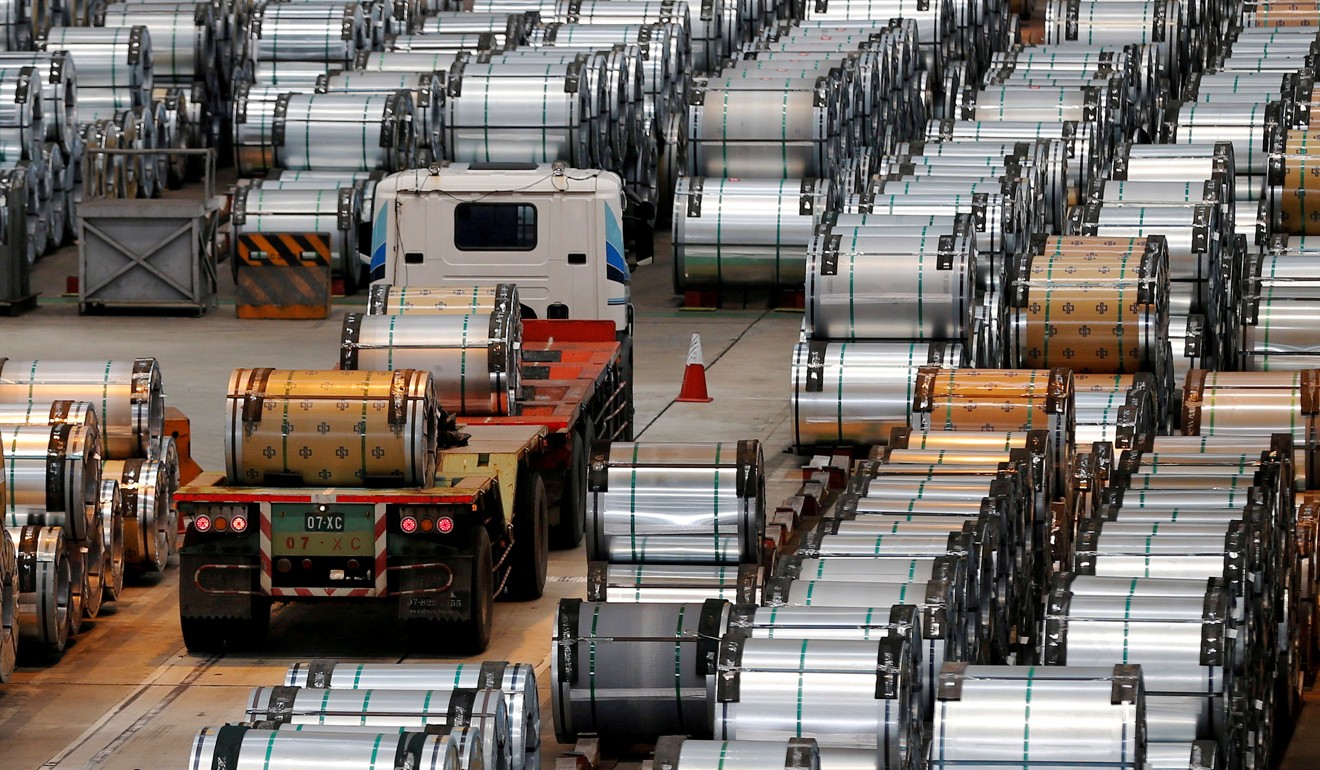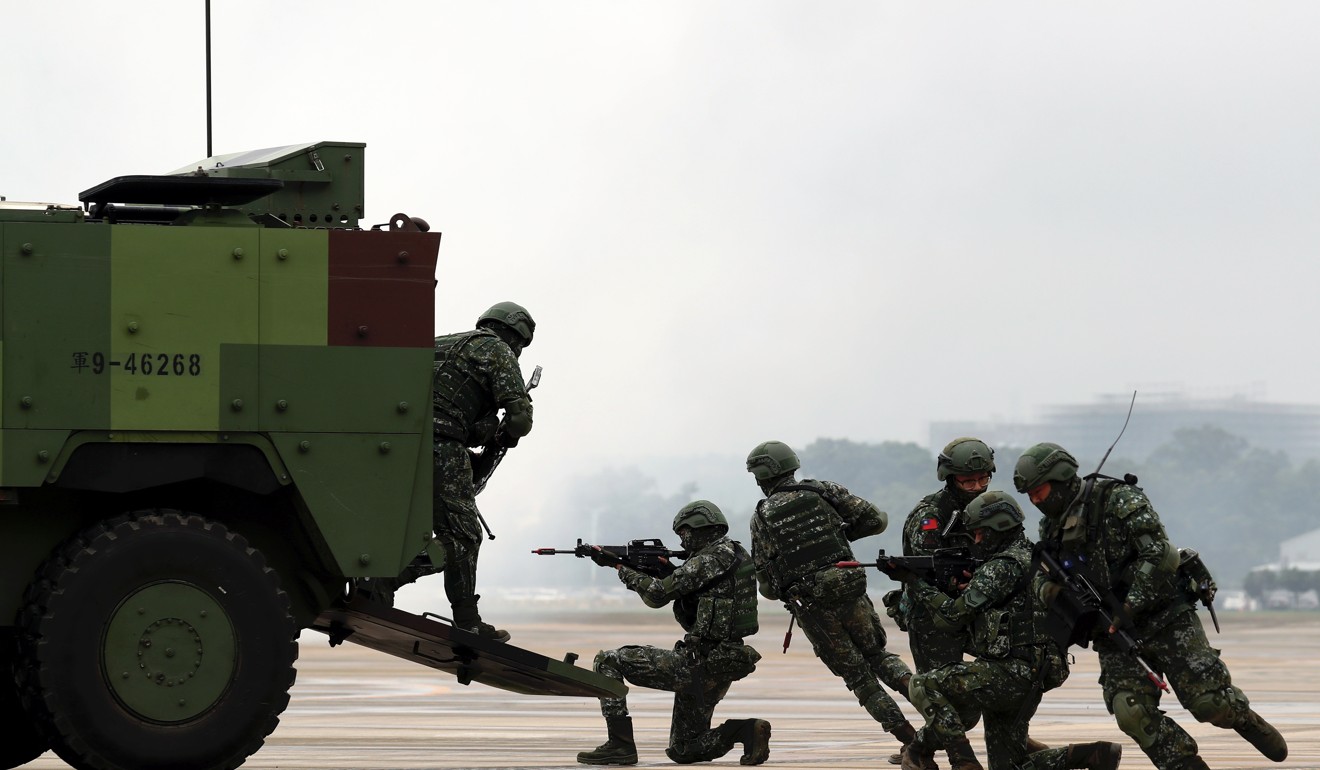
Taiwan – US security partner but silent victim in Donald Trump’s trade war
- Island’s dependence on the mainland economy has exposed it to the twists and turns of the tit-for-tat trade battle
- US president’s global tariffs have hurt steel exports to US
Numerous Asian economies linked to China’s fortunes are caught in the crossfire of the US-China trade war. But none might feel as voiceless as Taiwan.
The self-ruled island’s heavy dependence on the mainland economy has exposed it to the twists and turns of the tit-for-tat trade battle launched by US President Donald Trump months ago. But as a steel producer, it also is feeling the impact of Washington’s global steel and aluminium tariffs, which target China’s excess capacity in its steel sector, in particular.
Despite being a close military and security partner of the United States by law, Taiwan has limited diplomatic relations with Washington, mindful that any such exchange would anger Beijing, which considers the self-ruled island a breakaway province to be brought into line by force, if necessary.
A 24-year-old goods and services trade deal that is Taiwan’s only framework for an economic dialogue with the US was suspended last year amid problems filling vacancies for officials to administer the deal at the United States Trade Representative’s office as the trade war escalated.
Chern-Chyi Chen, deputy representative of economic affairs at Taiwan’s de facto embassy in Washington, said this week that Taiwan’s steel sales to the US had dropped 12 per cent since Trump gave the order in March for a 25 per cent tariff on imported steel and a 10 per cent tariff on aluminium, citing national security concerns.
Taiwan ‘will not retreat an inch’ as it commissions US-made frigates
“Taiwan is not exempted from the tariffs … we hope this will come to an end quickly,” the official said at an event presented by the Heritage Foundation, a Washington-based think tank.
Taiwan had lobbied for months to be exempted from the tariffs, which the US president imposed under Section 232 of the US Trade Expansion Act of 1962. Those efforts proved unsuccessful, despite other major economies winning either partial exemptions from the duties or a delay in the implementation date.

The US, which has no formal relations with Taiwan, had long been the biggest importer of Taiwanese steel. But amid the trade war and growing friction between Beijing and Taipei, mainland China surpassed the US in July to become the bigger buyer of Taiwan’s steel products as the US bought less, Taiwanese media reported.
Last year, Taiwan supplied 3.2 per cent of America’s steel imports, while mainland China supplied 2.9 per cent.
Taiwan ‘may consider’ US request for port call at Taiping Island
Chen said negotiation was the way to resolve the friction at a time of uncertainty in global trade relations.
He called the lack of channels for Taiwan-US discussions lamentable, saying they were needed to manage tensions. Keeping the lines of communication open allowed the US to update trade deals or understandings with South Korea and the European Union amid Trump’s tough trade action, he said.
“With Korea they have updated Korus [the United States-Korea Free Trade Agreement],” Chen said. “With the EU, Jean-Claude Juncker came to town [Washington] to agree to talk with the US administration … It’s evident that high-level economic dialogue is necessary.”
United States won’t allow force against Taiwan, new US envoy says
Walter Lohman, director of the Heritage Foundation’s Asian Studies Centre, echoed Chen’s view, saying Taiwan’s lack of a trade deal with the US was attributable “to the fact that they don’t have a regular dialogue”.
“The concern of Taiwan is not reaching the appropriate people or level in the administration,” he said.
Officials from each side at the deputy secretary level are to meet regularly under the goods and services trade pact the US signed with Taiwan in 1994 known as TIFA, for the Trade and Investment Framework Agreement. Trade under the pact totalled an estimated US$88 billion in 2014.

No TIFA meeting has taken place since Trump took power. The last one was in October 2016.
TIFA, the only framework of economic dialogue for Taiwan and the US, was suspended last year because all three deputy representatives in the US Trade Representative’s office had not been confirmed by Congress. While those vacancies have been filled this year, Taiwanese officials have suggested that TIFA could still be brushed aside by more pressing issues for Washington, including the trade dispute with Beijing.
Taiwan’s cosying up to Trump could spark a US-China war
Taiwan’s lack of a voice in Trump’s tariff war stands out amid the significance the US administration has increasingly attached to the island, as Washington and Beijing become more confrontational on both strategic and geopolitical fronts.
US Vice-President Mike Pence made America’s stance clear in an October speech in which he said “America will always believe Taiwan’s embrace of democracy shows a better path for all the Chinese people”.
Pence’s remarks sufficiently emboldened Taiwanese President Tsai Ing-wen to cite the speech during an address marking the 107th anniversary of the Republic of China and to declare that Taipei could cope with Beijing’s challenges.
Taiwan could do that by seeking further support from the US, Japan, Europe and other like-minded countries, and by strengthening its strategic significance so that other nations could rally behind it, Tsai said.
Taiwan independence protesters take to the street in Taipei
In a rare high-profile show of support for Taiwan, the US government in September recalled its top diplomats from three Central American and Caribbean countries that had recently cut diplomatic ties with Taipei in favour of Beijing.
The Trump administration also has approved two arms sales to Taiwan in the past two years, after its predecessors had denied many of Taipei’s requests for new weapons systems and delayed decisions on others over the past 10 years.

